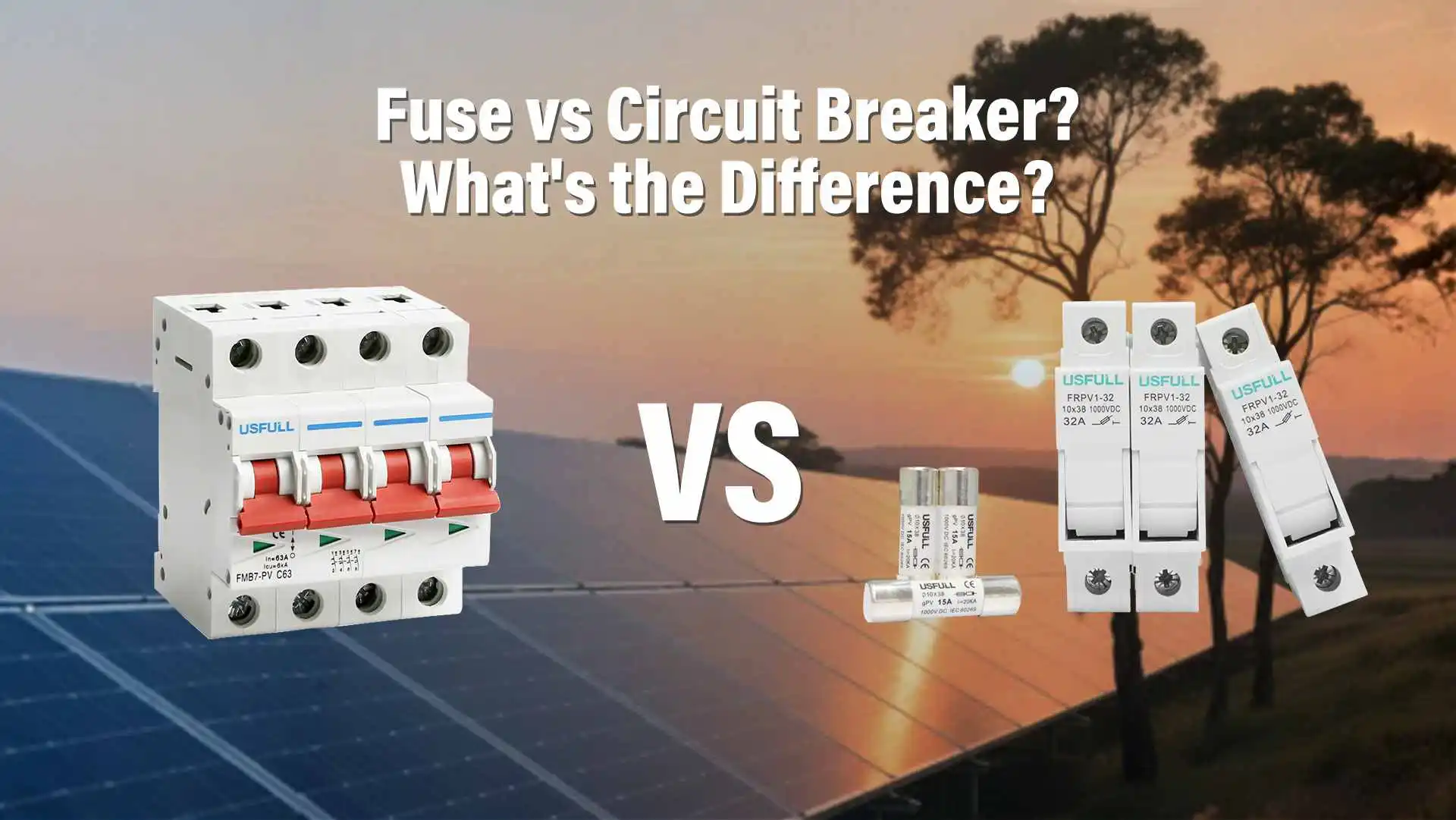Are you puzzled by the ongoing debate of Circuit Breaker Vs Fuse? You’re not alone.
Choosing the right electrical safety device for your home or business can feel overwhelming, but understanding Circuit Breaker Vs Fuse is crucial for safeguarding your property and loved ones. Imagine the peace of mind you’ll have knowing you’ve made the best choice for your unique needs.
This article will unravel the key differences between circuit breakers and fuses in a straightforward way. By the end, you’ll be equipped with the knowledge to make an informed decision. Stick around to discover which option is the real winner for you!
Basics Of Circuit Breakers
Circuit breakers are essential safety devices in electrical systems. They protect wiring and equipment from damage caused by excess current. Unlike fuses, circuit breakers can be reset after tripping. This makes them more convenient and cost-effective over time.
Understanding how circuit breakers work helps in choosing the right one for any application. Each type serves a specific purpose and fits different environments. Knowing common uses of circuit breakers clarifies their role in homes and industries.
How Circuit Breakers Work
Circuit breakers detect excess current and interrupt the flow immediately. They use an internal switch connected to a sensor. When the current exceeds safe levels, the switch trips to open the circuit.
This stops electricity from flowing and prevents overheating or fire. Circuit breakers can be reset by flipping the switch back on. This quick restoration saves time and avoids replacement costs.
Types Of Circuit Breakers
- Thermal Circuit Breakers: Use heat to trigger the trip mechanism.
- Magnetic Circuit Breakers: Use an electromagnet that trips with strong current.
- Thermomagnetic Circuit Breakers: Combine thermal and magnetic methods for protection.
- Ground Fault Circuit Interrupters (GFCI):Trip when detecting small current leaks to ground.
- Arc Fault Circuit Interrupters (AFCI):Detect dangerous electrical arcs and shut off power.
Common Applications
Residential homes use circuit breakers to protect wiring and appliances. They handle lighting, outlets, and major devices like air conditioners.
Commercial buildings rely on circuit breakers for larger electrical loads and safety compliance. Industrial settings use specialized breakers for heavy machinery and control panels.
Many vehicles and boats also use circuit breakers to manage electrical circuits safely.

Credit: www.usfull.com
Basics Of Fuses
Fuses protect electrical circuits by stopping excess current flow. They act as safety devices to prevent damage or fire. Fuses are simple, reliable, and widely used in homes and industries.
Understanding fuses helps in choosing the right protection for your electrical system.
How Fuses Operate
A fuse contains a thin metal wire or strip. When current exceeds a certain limit, the wire heats and melts. This breaks the circuit and stops the flow of electricity. The fuse must be replaced after it blows.
Different Fuse Types
- Cartridge Fuses – cylindrical shape, used in industrial equipment
- Blade Fuses – flat plastic body, common in vehicles
- Glass Tube Fuses – transparent body, easy to inspect
- Resettable Fuses – automatically reset after overload clears
Where Fuses Are Used
Fuses protect household wiring and appliances. They safeguard automotive electrical systems. Industrial machines rely on fuses to avoid costly damage. Many electronic devices use fuses for internal protection.
Safety Features Compared
Understanding the safety features of circuit breakers and fuses is crucial for protecting your home or workplace electrical system. Both devices prevent damage from electrical faults, but they operate differently. Let’s dive into how each handles safety, so you can make an informed choice for your needs.
Response Time And Reliability
Circuit breakers react quickly to electrical faults, often tripping within milliseconds. This rapid response minimizes damage and reduces fire risks. Fuses also blow fast but can sometimes take slightly longer depending on the type.
Reliability matters when you need consistent protection. Circuit breakers maintain their function over many cycles, while fuses require replacement after a single use. Have you ever experienced a fuse blowing at an inconvenient time? That’s where circuit breakers have an edge in reliability.
Overload And Short Circuit Protection
Both devices protect against overloads and short circuits but handle them differently. A fuse contains a thin wire that melts under excessive current, breaking the circuit instantly. Circuit breakers use an internal switch mechanism triggered by heat or magnetic force to interrupt the flow.
Think about the risks: a fuse’s melting wire ensures a complete break but offers no warning before failure. Circuit breakers can provide alerts through tripped switches, helping you identify problems early. Wouldn’t you prefer a safety device that not only protects but informs you?
Resetting Vs Replacement
Resetting a circuit breaker is as simple as flipping a switch back to the “on” position. This convenience saves time and money, especially in settings where frequent trips might occur. Fuses, however, require you to remove and replace the blown unit, which can be frustrating if you don’t have spares ready.
Imagine dealing with a fuse box in poor lighting or tight spaces—it’s not always an easy task. Circuit breakers offer a straightforward reset process that anyone can manage without special tools. How much value do you place on quick recovery after an electrical fault?

Credit: www.etei.com
Cost And Maintenance
Understanding the cost and maintenance differences between circuit breakers and fuses can help you make smarter choices for your electrical setup. These elements don’t just protect your devices—they also impact your wallet and time. Let’s break down what you can expect in terms of expenses and upkeep.
Initial Investment
Fuses generally have a lower upfront cost. You can buy a pack of fuses for just a few dollars, making them attractive for tight budgets.
Circuit breakers, however, are pricier at first. They require more complex manufacturing and installation, which adds to the initial cost.
But consider this: are you willing to invest more now to potentially save trouble later?
Long-term Expenses
Fuses need to be replaced every time they blow. This adds up quickly if you face frequent electrical issues.
Circuit breakers can be reset after tripping, avoiding replacement costs. This feature often lowers your long-term expenses significantly.
Think about how often you deal with power surges or short circuits; your choice could affect your budget down the road.
Ease Of Maintenance
Replacing a fuse is simple but requires you to have spares on hand and identify the correct type.
Circuit breakers offer easier maintenance since resetting them takes just a flip of a switch—no spare parts needed.
Which would you prefer: the hassle of swapping fuses or the convenience of a quick reset?
Installation And Compatibility
Installation and compatibility are key factors when choosing between a circuit breaker and a fuse. Both devices protect electrical circuits but differ in how they fit into your system. Understanding these differences helps ensure safety and efficiency.
Wiring Requirements
Circuit breakers require specific wiring to fit into breaker panels. They connect directly to the panel’s bus bars. This setup allows easy installation and replacement.
Fuses need fuse holders or blocks for wiring. These holders must match the fuse size and type. Wiring a fuse system can be less flexible than breakers.
Space And Size Considerations
Circuit breakers are larger and need more panel space. They come in standard sizes for residential and commercial use. Their size allows for easy resetting without removal.
Fuses are smaller and take less space in fuse boxes. They are compact but require removal and replacement after a trip. Space savings can be important in tight installations.
System Compatibility
Circuit breakers fit well in modern electrical panels. They work with most residential and industrial systems. Breakers offer easy upgrades and integration.
Fuses suit older or specialized systems. Some machines require fuse protection due to specific standards. Compatibility depends on system age and design.
Performance In Different Environments
Performance of circuit breakers and fuses varies widely depending on the environment where they are used. Understanding how each device behaves in different settings can help you make smarter choices for safety and efficiency. Let’s look at how these protective devices perform in typical residential areas, tough industrial spots, and special conditions that demand unique considerations.
Residential Use
In homes, circuit breakers are often preferred because they are easy to reset after a trip. You don’t have to replace anything, which saves time and effort. If you’ve ever had a power outage caused by a fuse blowing, you know the hassle of tracking down a replacement.
Fuses, while less common in modern homes, still have a place in older electrical systems. They offer quick and reliable protection but require replacement once they blow. If you live in a house with frequent power surges, a circuit breaker’s reset feature might be a better fit for your lifestyle.
Industrial Settings
Industries require robust and reliable protection due to high power loads and complex machinery. Circuit breakers shine here because they can handle repeated trips and resets without needing replacements. This reduces downtime and maintenance costs significantly.
Fuses in industrial environments must be carefully selected for their speed and rating. They can react faster to short circuits, protecting sensitive equipment from damage. However, replacing blown fuses can cause delays and increase labor costs, especially in large-scale operations.
Special Conditions
Some environments expose electrical systems to extreme temperatures, moisture, or vibration. Here, the choice between circuit breakers and fuses depends on the specific challenges you face. For instance, circuit breakers with sealed enclosures can resist dust and humidity better than exposed fuses.
In areas prone to explosion risks, like chemical plants, you might prefer fuses designed to minimize sparks during failure. Have you considered how environmental factors like these impact your electrical safety? Understanding these nuances can save you from costly mistakes.
Common Myths and Misconceptions
Understanding the differences between circuit breakers and fuses is crucial for anyone dealing with electrical safety. However, many common myths cloud the real facts, leading to confusion and sometimes unsafe decisions. Let’s clear up some of these misunderstandings so you can handle your electrical systems with confidence.
Safety Myths
One popular myth is that fuses are always safer than circuit breakers because they “fail completely” when overloaded. In reality, both devices are designed to protect you from electrical hazards, but circuit breakers can be reset without replacing parts, making them more user-friendly.
Another misconception is that circuit breakers can fail silently and cause fires. While no device is perfect, modern circuit breakers undergo rigorous testing and usually provide reliable protection. Have you ever ignored a tripped breaker thinking it’s a minor glitch? That’s risky—always investigate the cause promptly.
Functionality Misunderstandings
Many believe that fuses and circuit breakers perform the exact same function in the same way. While both interrupt current flow during faults, fuses melt to break the circuit, whereas breakers use a switch mechanism. This difference affects how quickly they respond to faults and how easy they are to restore after a trip.
Some think that circuit breakers can’t handle small, gradual overloads as well as fuses. Actually, breakers often have adjustable trip settings that can protect against subtle current changes. If you’ve ever replaced a fuse multiple times for the same issue, switching to a breaker might save you time and frustration.
Choosing The Right Protection Device
Choosing the right protection device for your electrical system is crucial for safety and efficiency. Both circuit breakers and fuses serve to protect against overloads and short circuits, but selecting the best fit depends on your specific needs. Understanding the key factors will help you make a decision that safeguards your equipment and home.
Factors To Consider
Start by evaluating the type of electrical system you have. Circuit breakers offer reset capabilities, which can save time and money compared to replacing a fuse every time a fault occurs.
Think about the current rating and breaking capacity required. For example, high-power industrial machines might need a device that handles greater fault currents.
Maintenance and ease of use also matter. Circuit breakers are easier to manage since you can reset them without tools, unlike fuses that must be replaced after a fault.
Expert Recommendations
Electricians often suggest circuit breakers for residential use due to their convenience and reliability. However, fuses still have a place in specific applications where fast response to short circuits is critical.
Experts advise checking local electrical codes and standards before making your choice. This ensures compliance and avoids potential safety issues.
Many professionals recommend pairing devices with appropriate surge protection to extend the life of your electrical system.
Future Trends In Circuit Protection
Smart circuit breakers with remote monitoring are gaining popularity. These devices let you track electrical loads and detect faults before they cause damage.
Integration with home automation systems is becoming common, allowing you to control and monitor protection devices from your smartphone.
Advances in materials and technology may soon offer even faster and more precise protection options, enhancing safety for all users.
Frequently Asked Questions
What Is the Main Difference Between Circuit Breaker and Fuse?
A fuse melts to break a circuit during overload, while a circuit breaker trips and can be reset. Circuit breakers offer reusable protection, unlike fuses, which must be replaced after one use.
Which Is Safer: Circuit Breaker Or Fuse?
Circuit breakers are generally safer as they can quickly disconnect power and be reset. Fuses may pose fire risks if replaced improperly or if the wrong type is used.
How Do Circuit Breakers And Fuses Protect Electrical Circuits?
Both prevent damage from overload or short circuits. Fuses melt to break the circuit, and breakers trip a switch to stop current flow, protecting wiring and devices.
Can Circuit Breakers Replace Fuses In Homes?
Yes, circuit breakers can replace fuses and provide easier reset and better protection. Many modern homes use breakers for convenience and safety over traditional fuses.
Conclusion
Circuit breakers and fuses both protect electrical circuits from damage. Circuit breakers can be reset after tripping, which saves time and money. Fuses need to be replaced once they blow, making them less convenient. Each has its own place depending on the need and budget.
Safety should always come first when choosing between them. Understanding their differences helps you make a smart choice. Choose the right device to keep your home or workplace safe. Simple and clear protection works best for everyone.








